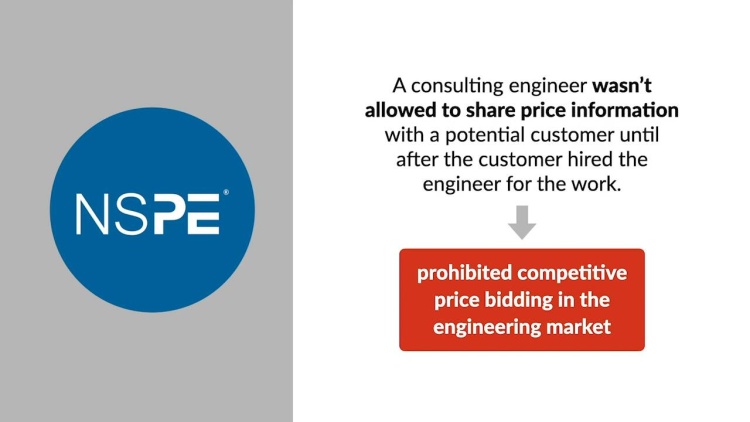National Society of Professional Engineers v. United States
United States Supreme Court
435 U.S. 679, 98 S.Ct. 1355, 55 L.Ed.2d 637 (1978)
- Written by Nicholas Decoster, JD
Facts
In 1935, the National Society of Professional Engineers (the Society) (defendant) was established to help promote the non-technical aspects of the engineering profession. The goals of the Society included promoting the economic and professional interests of its members. In a code of ethics distributed by the Society to its members, the Society prohibited consulting engineers from sharing price information with potential customers prior to being selected for a specific position, effectively prohibiting competitive bidding in the market for engineering services. The Society contended that competition on price among engineers was detrimental to the public, because such competition would incentivize engineers to submit deceptively low bids and cut corners and would lead to a practice of awarding engineering contracts to the lowest bidder without regard to quality. The United States (plaintiff) believed that the Society’s agreement violated § 1 of the Sherman Act as an unreasonable restraint on trade. The district court agreed with the government and issued an injunction preventing the Society from endorsing any agreement to refuse to share prices until after an engineer had been selected for a specific position. The Society appealed, and the court of appeals affirmed the decision. The Society appealed again.
Rule of Law
Issue
Holding and Reasoning (Stevens, J.)
What to do next…
Here's why 905,000 law students have relied on our case briefs:
- Written by law professors and practitioners, not other law students. 47,100 briefs, keyed to 995 casebooks. Top-notch customer support.
- The right amount of information, includes the facts, issues, rule of law, holding and reasoning, and any concurrences and dissents.
- Access in your classes, works on your mobile and tablet. Massive library of related video lessons and high quality multiple-choice questions.
- Easy to use, uniform format for every case brief. Written in plain English, not in legalese. Our briefs summarize and simplify; they don’t just repeat the court’s language.





